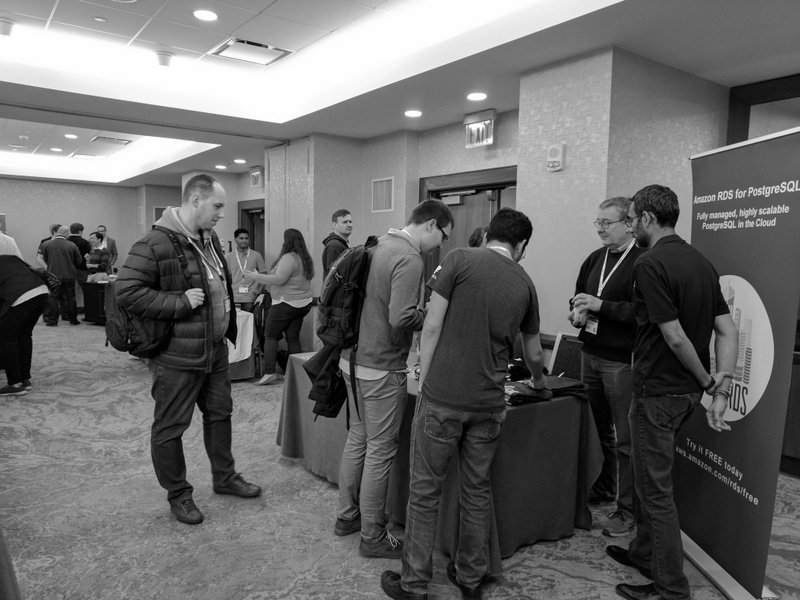Attendees of PgConf.US , if you haven't gotten your hotel room booked, now is the time! Our block ends on March 6th. Point your browser over here and book that room. While you wait for your email confirmation from the Westin, you can take some time to review the following talk from PgConf US 2015, ToroDB: a new, open-source, document-oriented, JSON database, built on Postgres.
- Partitioning in Postgres v10 by Corey Huinker
- Building a scalable time-series database on PostgreSQL by Mike Freedman
- Major Features: Postgres 10 by Bruce Momjian
- Conference: Amazon Web Services
- Premiere: OpenSCG, 2ndQuadrant, Compose
- Facilities: Timescale
- Media: @amplifypostgres
With January upon us, we start conference season. This year, PostgresConf 2019 will be in NYC at the Sheraton New York Times Square March 18-22, 2019.
If you have a story about lessons learned with Postgres, a cool feature that you've found a creative way of using, or just some practical knowledge you'd like to share with your fellow Postgres users, submit a talk. Remember, there are many people who are new to Postgres, so introduction levels talks are welcome. The CFP ends this Friday so get your talks submitted soon at:
Also, the Early Bird window for PostgresConf 2019 will be ending next Friday, January 18. This tickets are pretty substantially discounted if you purchase them early. On top of the Early Bird discount, for being a member of the NYC Postgres User Group, there is a promo code for an additional 15% off. Just use the code 2019_PUG_NYC when buying your tickets.
Join the PostgreSQL community in Philadelphia on July 13th and 14th 2017 for two days of fantastic PostgreSQL content. July 13th will contain trainings and July 14th will be breakout sessions. The call for papers and sponsors is also open! When submitting papers to PGConf US events, please review the presentation guidelines.
PGConf US Local events are designed to bring comprehensive educational content and networking opportunities to the "local" PostgreSQL community where the event is being held. They are perfect opportunities to show support for PostgreSQL, find leads and build relationships with other professionals and companies using and support PostgreSQL.

With the pending GA release of Star Link, more cities adopting municipal WIFI, and the growth of remote work due to the pandemic, one would assume that cell phone providers would be falling hand over fist to provide quality services at a quality price. Unfortunately this is not the case and it is hurting the future of our workforce.

Carriers currently think that 30GB of Hotspot data is enough for the average digital nomad. While that may have been the case previously, it isn’t any longer. There is a hundreds-of-thousands-strong workforce specializing in Information Technology, Digital Design, Web Development, and other creative industries. They are living, working and adventuring in RVs, Sprinters, Skooolies (pictured), and other vehicle dwelling options. This community is nomadic by design and should not be artificially limited by technology.
Why is it that we are being charged so much money for so little? Outside of two providers announcing rural initiatives, we are still acting like data needs are small and that they come at a quality price. Data is ubiquitous; it is the new water (for getting work done). In the new economy workers need faster, higher quality, and unlimited amounts of data to get their job done.
Where could you go and what could you experience if you weren’t tethered by the faux limitations of bandwidth?
Resources
Featured Content
Community,

It is late August, 2019. This is the time where we are usually prepping for the very busy fall season and not much else. However, this is the Year of Postgres and everyone is driving 200MPH down the ecosystem highway (321.8688/KPH). We are going to kick off this newsletter with some exciting information about the community.
Events
PostgresConf has launched Digital Events! The goal of Digital Events is to open our education platform year round to all members of the community. Our first series of events will be held with our ecosystem partner YugabyteDB and their “Distributed SQL Webinar Series.” This is a series of free-to-attend Webinars exploring Distributed SQL from leaders in the field.
PostgreConf Silicon Valley tickets are going at a brisk pace and half day trainings are almost sold out. Register today to reserve your seat before prices go up on September 1st!
Right after Silicon Valley, PostgresConf South Africa is kicking off. This conference has grown by leaps and bounds over the last two years. We highly recommend attending for anyone who can!
PGConf.IN (India) has announced that their conference will be held in February 2020!
Meetups
We have seen the launch of three new meetups this month:
- Los Angeles Postgres The first meetup is planned for late October or early November as we continue to build the Silicon Beach community.
- Toronto Postgres Similar to Los Angeles, the first meetup is planned for late October or early November.
- Charm City Postgres This meetup was formed by long time community member Robert Treat.
Several other meetups are growing quickly:
- Montreal Postgres has reached a respectable 358 members.
- Vancouver Postgres has reached over 400 members.
- Seattle Postgres has begun to grow again with a new schedule of events!
Interested in speaking or hosting a meetup? Contact us and we’ll connect you with the right people!
Learn
Here is a short, great introduction tutorial on running PostgreSQL in Docker by Igal Sapir, Los Angeles Postgres organizer. Everybody has 13 minutes.
Shawn Wang from our friends at High Go has provided an insightful write-up on AES Performance.
Ecosystem
TimescaleDB is running a “State of Postgres” survey. Please take five minutes and help them out! They have also announced a new Distributed Timeseries product.
VMWare has just acquired Greenplum and PostgreSQL supporting company Pivotal.
Postgresql.org
PostgreSQL versions 11.5, 10.10, 9.6.15, 9.5.19, 9.4.24, and 12 Beta 3 are now out in the wild and addressing several important security concerns and bug fixes.
---
Have news you’d like included in future newsletters? Contact us.

As Postgres Conference pushes forward in the brave new world, we evolve and increase the ability for the People, Postgres, Data community to succeed. As a part of our positive adaptation we have a new website that features upcoming events, professional content (written and video), and the best in our written community via “Community Content”.
Discord
In an effort to provide a modern, friendly, and inclusive community platform, we have launched a Discord server for all things Postgres. We are providing a helpful experience with rule #1 being: Be Nice. Our discussions will branch out beyond the core of PostgreSQL and provide a forum for success with Postgres and related technologies. Join us for what is guaranteed to be a refreshing experience for the community: https://discord.gg/tjxNBCz
2021
We are seeking feedback from our community on 2021 in-person events. We are currently considering the East Coast event for October 2021 and the West Coast event for December 2021. Please help us in determining the type of event you would like to participate in!
Upcoming live events
We currently have the following webinars scheduled through October:
- September 9th, 10AM PST: PostgreSQL Parallelism Do’s and Don’ts
- September 15th, 10AM PT: Monitoring Strategy Considerations
- September 29th, 10AM PST: Introduction to PostgreSQL ColumnStore Indexes
- September 16, 10AM PT: How To Query Against Multiple Postgres Instances As If They're One Server Using Starburst Presto
- September 29, 10AM PST:Introduction to PostgreSQL ColumnStore Indexes
- September 30, 10AM PT: Live Demo: Creating A Single Point Of Access To Multiple Postgres Servers Using Starburst Presto
- October 14, 10AM PT: Live Demo: Live Demo: Unlock Data In Postgres Servers To Query It With Other Data Sources LIke Hive, Kafka, Other DBMSs, And More.
Oh my goodness, Data Days!

CFP Dates:
- Open until: 10/15/2017
- Notification: 10/18/2017
- CFP Link
Call for papers will be open until Sunday, August 24th, 2017 and speakers will be notified of acceptance/decline no later than Monday, September 1st, 2017.
Conference Schedule:
- Friday, September 29, 2017: Trainings
Mastering Postgres Administration: Bruce Momjian
Postgres Performance and Maintenance: Joshua D. Drake
- Saturday, September 30, 2017: Breakout Sessions (To be announced)
Registration for the PGConf Ohio trainings is open now.
Conference speakers receive complimentary entry to the breakout sessions on September 30th. The half-day training options on September 29th are separately priced sessions. As a nonprofit event series, funding is currently not available for speaker travel and lodging accommodations.

